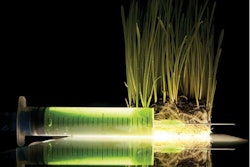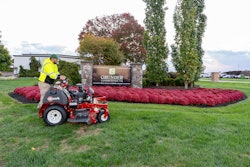 Debunking the myths about pesticides and lawn care
Debunking the myths about pesticides and lawn care
Most people understand the benefits of pesticides. Yet, the myths surrounding pesticides sometimes fuel sensational headlines where these products get a bum rap and the facts get lost in the shuffle.
It’s no surprise that emotions run high on the topic of pesticide use. Those who oppose pesticides see it as a matter of safety, so they are advocating restrictions for all the right reasons. It’s important to take this into account when educating clients — or even city councils. Stick to and present the facts in a professional manner and position yourself as concerned and informed, and you may not only earn the trust and business of new clients, but also become a go-to person in your community regarding these issues.
“Everyone in our industry has an important role to play in ‘debugging the myths’ about lawn care. The absence of good information and misinformation drives the debate about product use,” says Karen Reardon, director of communications for Responsible Industry for a Sound Environment. RISE is a trade association of manufacturers, formulators and others also concerned with related legislative and regulatory issues. See debugmyths.com for more info.
“The majority of people understand the benefits of DIY or professionally applied pesticides. They come into contact with the benefits of pesticides every day, especially in the lawn and garden area where healthy turf and plants perform a range of functions from preventing run-off to keeping allergy-causing weeds at bay,” Reardon says. But it still is critical that landscapers be on-the-ready to educate the public on the benefits of pesticides that are used properly and dispel the common myths.
Myth: Pesticides are not a necessary part of lawn care.
Fact: “Not only are pesticides necessary, they work to protect people from potential diseases and other health issues by reducing the populations of insect pests that spread disease and cause illness,” Reardon says. Without pesticides to keep mosquitoes and ticks in check, instances of West Nile virus and Lyme disease, both of which can be life-threatening, would increase. So would allergies were it not for herbicides that target ragweed, poison oak, poison ivy and other toxic plants.
Myth: Pesticides will harm my family and pets.
 Fact: If used correctly and according to the label, pesticides pose no threat to you, your family or your pets. All pesticides are scrutinized by the Environmental Protection Agency, which even focuses its testing on sensitive groups such as children and immune-suppressed individuals. “Only products determined to have a reasonable certainty of no harm to the environment or human health can be registered by EPA,” Reardon says.
Fact: If used correctly and according to the label, pesticides pose no threat to you, your family or your pets. All pesticides are scrutinized by the Environmental Protection Agency, which even focuses its testing on sensitive groups such as children and immune-suppressed individuals. “Only products determined to have a reasonable certainty of no harm to the environment or human health can be registered by EPA,” Reardon says.
Myth: Integrated Pest Management alone will control weeds and insects.
Fact: This myth is tricky because the answer is yes, IPM alone will control weeds and insects. However, what a client may not realize is IPM, the gold standard for lawn care, includes the judicious use of pesticides. The goal of IPM is to eliminate or control as many pests as possible through proper turf care, monitoring and mapping pests and their lifecycles and “taking advantage of all appropriate pest management options,” according to the EPA’s definition.
Myth: Fertilizer will run off and contaminate water supplies.
Fact: Misuse of pesticides can result in runoff, which is what perpetuates the misconception that fertilizers contribute to runoff and water contamination. However, university research indicates under normal circumstances and use, phosphorus from fertilizer does not significantly contribute to nutrient runoff —all the more reason to have it professionally applied.
Education Is The Key To Safe Applications
While there are household items such as aspirin, table salt and gasoline that can be much more toxic than many pesticides, it still is important for contractors to stay up-to-date on proper pesticide applications and follow directions diligently. By design, pesticides are toxic and “can damage human and environmental health,” says Fred Kapp, Educational Director of the Alabama Green Industry Training Center, which strives to educate professionals about responsible pesticide usage. “Education is the answer. We encourage all professionals and their employees to enroll in high quality, verifiable training to protect their companies, customers and environment and to satisfy federal and state laws,” Kapp says.










